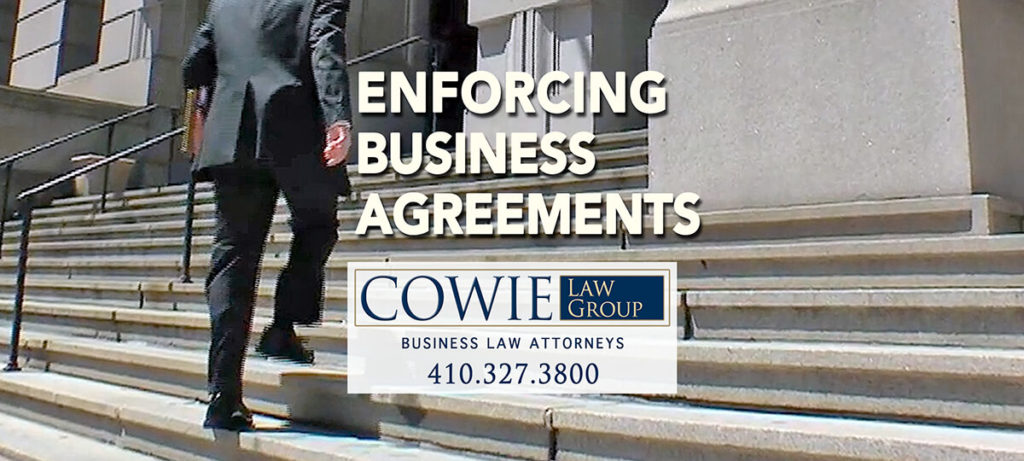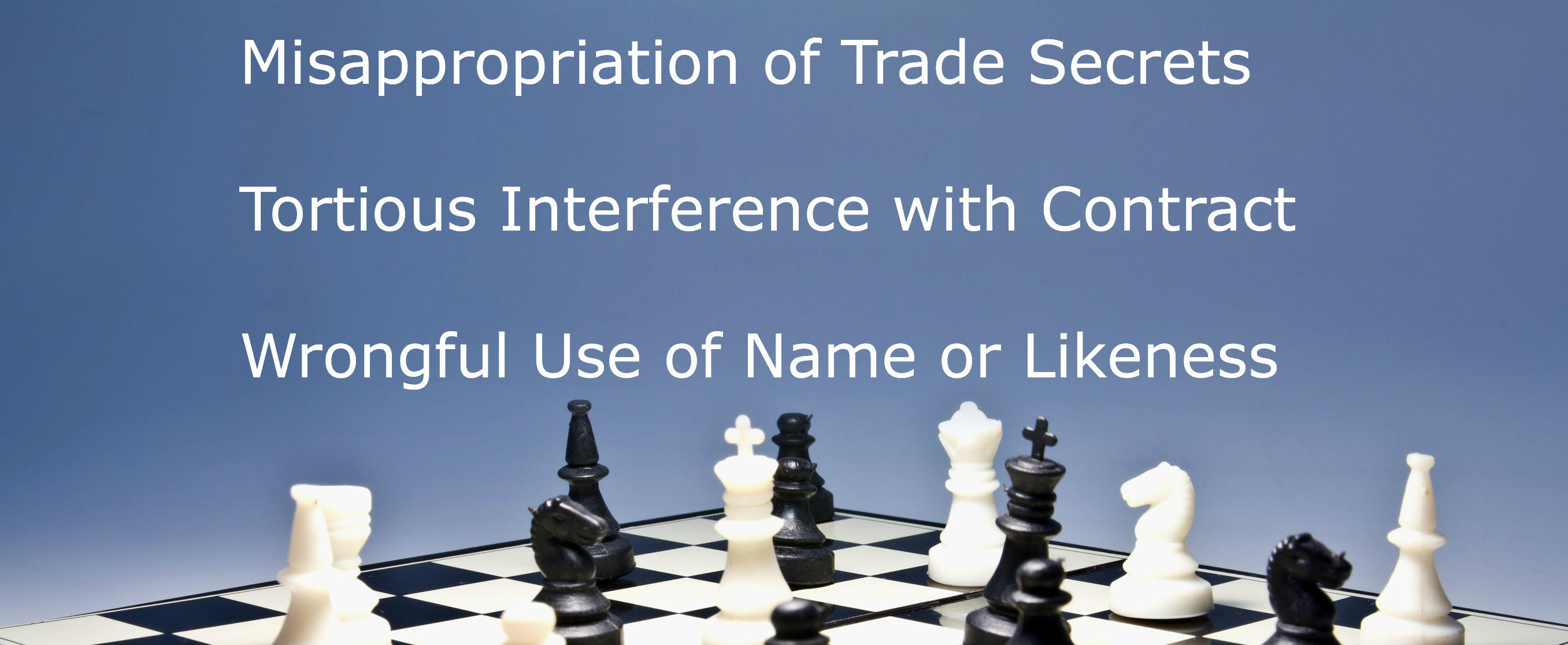Legal Agreements that can Protect Maryland Businesses from Unfair Competition:
Non-solicitation, Non-disclosure, Confidentiality and Non-competition Agreements
Maryland Business Litigation Attorneys and Lawyers can assist Companies in the Contractual Protection of their Proprietary Information and other Business Assets through Written Agreements with Clients, Business Partners, Subcontractors and Employees.
When transacting business, companies must often disclose confidential or proprietary business information developed through hard work and monetary investment. For example, client contact lists, marketing strategies, business opportunities, employee identities and skills, manufacturing techniques and technology. If not protected, such information can be unfairly used by existing and potential competitors.
Companies doing business in Maryland have a legal right to protect or restrict the use of such information when transacting business by entering into agreements that contain contract provisions: (1) prohibiting solicitation of employees and customers; (2) requiring that disclosed information be kept confidential; and (3) restricting certain types of unfair competition. Such provisions are often added to employment agreements, subcontracts, business purchase agreements, service contracts and other business transaction agreements.
No contractual provision can prevent misappropriation of proprietary business information or instances of unfair completion. However, if enforceable, such contractual provisions can make it much easier for a Maryland business litigation lawyer to enforce rights, protect business interest and resolve business disputes. As such, these contractual provisions can serve as a strong deterrent. To this end, additional provisions providing for the recovery of attorneys’ fees and other litigation expenses and the choice of court location and applicable law can also be incorporated.
This article contains a brief overview of some contractual provisions commonly used by Maryland business lawyers and litigation attorneys to protect information disclosed in connection with conducting business and engaging in business transactions. Whether or not such contractual provisions will be enforceable through emergency injunctive relief (e.g., temporary restraining orders) or monetary damages or both, will depend on how they are written and the facts of each case, including the type of business involved. Therefore this article should not be relied upon as legal advice. Consultation with an attorney is esential when entering into or seeking to enforce any agreement containing such contractual provisions.

Non-solicitation Agreement
A Non-solicitation Agreement is an agreement that contains a contractual provisions under which a party to the agreement promises not to solicit the other parties’ employees or customers by hiring them away or seeking out their business.
Non-solicitation provisions are used in employment agreements to prevent employees from soliciting other employees or customers of a business after terminating employment. These provisions are also used by businesses in subcontract agreements and service agreements to prevent contract partners or clients from luring away skilled company employees or interfering with valued customer relationships.
A Non-solicitation provision is typically limited in time to the duration of agreement and for an additional period of time after the agreement has ended. There are many direct and indirect ways to solicit a businesses’ employees and clients so the meaning of the terms “solicitation,” “employee” and “customer” as used in a non-solicitation provision should be carefully defined to meet the circumstances the business in question.
Non-disclosure or Confidentiality Agreement
A non-disclosure agreement (also known as a “confidentiality agreement”) is an agreement that contains a contractual provision whereby one party to the agreement promises not to disclose or otherwise use information received from the other party, except as specifically permitted under the agreement.
Non-disclosure agreements are entered into when two companies are considering doing business and need to have access to each other’s business information and technology for the purpose of evaluating potential business relationships or working together to pursue a joint business opportunity. Non-disclosure provisions are also utilized in employment agreements to restrict employees’ use and dissemination of confidential information owned by or disclosed to the employer.
Non- disclosure agreements are designed to protect trade secrets and other proprietary information by prohibiting a party from disclosing information covered by the agreement. In order to effectively enforce such an agreement it should: (1) identify the confidential material, knowledge or other information that is to be disclosed and/or kept confidential; (2) define the limited manner in which that information can be used, if at all; and (3) describe how the information should be handled / protected, including the identify which individual employees can have access to that information and under what circumstances.
Other uses for non-disclosure provisions include agreements negotiated with websites to remove photographs, logos or other proprietary information when the publication thereof constitutes an invasion of privacy or violation of other legal rights. Such agreements include a promise not to disclose the content in the future (or to or destroy it) as well as payment of damages if the website publishes the content in the future.
Non-competition Agreement
A non-competition agreement (also known as a “non-compete agreement”) is an agreement that contains a contractual provision under which one party agrees not to enter into business competition with the other party for a period of time in a specific geographical area. Non-competition provisions are best known for their use in employment agreements to prevent employees from leaving to start up competing companies or to work for competitors. Employers justify these agreements because they invest time and money in teaching employees the company business, and, in some cases, entrusting them with confidential proprietary information, only to have them use that knowledge to start an identical business in direct competition with them.
Non-competition contractual provisions are also used outside the employer-employee context. For example these provisions are useful in connection with the purchase of a business where the business seller agrees not to start a new business that competes with the business being purchased.
Where employment agreements are concerned, non-competition agreements must not be overly broad so as to unreasonably retrain trade and the ability to earn a livelihood. Generally, courts will enforce non-compete agreements against employees who provide unique services, or to prevent a former employee’s misuse of trade secrets and client lists, or solicitation of customers. In such cases the restriction on completion must be reasonably limited in geographic scope and duration as reasonably necessary for the protection of the employer’s justifiable legitimate business interest without imposing undue hardship on the employee or disregard of the public interests. Nonetheless, even overly broad non-competition agreement may be enforceable under Maryland’s “blue pencil rule,” which allows a Judge to strike the overbroad portion of a non-competition agreement and, in some cases, still enforce remaining provisions.
For more information about legal agreements that protect Maryland businesses from competition, contact one of the Maryland business litigation attorneys and lawyers at the law firm of Cowie Law Group, P.C.
MARYLAND BUSINESS LITIGATION ATTORNEY AND LAWYERS
1321 Generals Highway, Suite 302, Crownsville, MD 21032 • Telephone: 410-327-3800 • Facsimile: 410-327-3801






2 thoughts on “MARYLAND BUSINESS LITIGATION ATTORNEYS AND LAWYERS – Business Agreements Maryland Attorneys Use to Protect Companies from Unfair Competition”